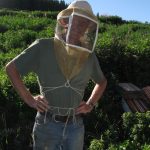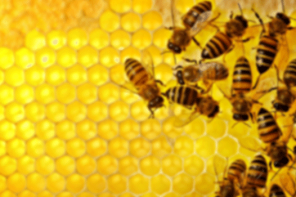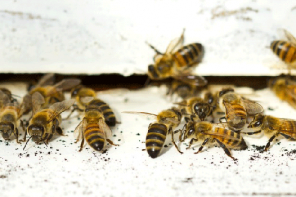Grand Slam
By: Ed Colby
Yesterday was a grand slam. First I got a massage from a chiropractor of rare talent. She trades her services for our honey, beef and lamb.
Then, a couple of hours skiing on Aspen Mountain. The Aspen Skiing Company kindly awarded my gal Marilyn and me lifetime passes, in recognition of my 44 years on the ski patrol. As a patrol retiree, I no longer have to tackle the gnarliest runs or carry bundles of bamboo on my shoulder while skiing. I don’t have to listen to my patrol radio or touch a toboggan. Skiing’s fun again!
Next, my annual Medicare physical, from a physician who sees things my way. Look, I’m 70 years old. Nobody lives forever; I’ll take my chances. Let’s not go chasing test results that might sit me bolt upright in the middle of the night. And please, no risky biopsies in certain sensitive bodily nether regions. I’ve been in the hospital. I’d rather spend my time in the beeyard. The good doctor took all this in and nodded sagely.
I told him that cannabidiol, or CBD, cured the arthritis in my hands. Used to be I couldn’t button my shirt without help. CBD might not be legal where you live, but here in wild west Colorado all the pot shops stock it. CBD is derived from marijuana but does not make you high.
Then, after my physical, I walked across town to the annual mid-season Aspen Mountain Employee Appreciation party, of which I was a sponsor. Lesson learned: Next year we should order less beer and more pizza!
I was going to ski another day this week, too, but I got caught up in the endless complications of submitting to Colorado’s state pesticide czar recommendations for amending the state’s Managed Pollinator Protection Plan (MP3). The state’s current plan basically states that pesticide applicators ought to follow label directions, if it’s convenient. The Colorado State Beekeepers Association (CSBA) argues that the plan would be more effective if it had some teeth.
The Pollinator Stewardship Council did the heavy lifting to get the CSBA’s MP3 recommendations to CSBA members so they could sign them online, using mysterious “Salsa lab” computer technology that I do not pretend to comprehend. There were details, questions and last minute changes. I needed to stick around, so my ski plans got canceled. I’d wanted to ski in the morning and look at bees in the afternoon on the way home.
OK, I didn’t get to go skiing. I still checked the aforementioned bees at 1:30 sharp, because I’d made a reservation the week before to do so. They belong to a billionaire who likes honey bees and pays me to look after his. You could Google this gentleman’s name. He’s controversial.
On most properties where I keep bees, I come and go as I please. At this particular apiary, however, my instructions are to call before I visit the bees, so that there’s someone to “buzz me in” through a series of locked gates, and so they know I’m coming.
Last June I sold this guy four hives, for a song. Mea culpa, but he pays me handsomely to take care of his bees, so everything’s all right. It’s just that beekeeping is a little more complicated when it’s on a billionaire’s estate. Take hive access: I can only visit his little darlings Monday through Friday, nine to five, provided I’ve called ahead. I can’t just drop by if I happen to be in the neighborhood.
I don’t deal with the billionaire directly but rather through his personal assistant. The assistant is a good kid. He relays information about the bees to the owner, who is rarely mentioned by name. He’s simply “the owner.” The owner knows a little about bees and has concerns about their care and feeding. I’m working to win his confidence.
Then there’s the owner’s chef. He got all indignant when the honey I dropped off last September crystallized. I tried to explain, but there are people you just can’t get through to.
The hives themselves are bomber. When I sold them last June, they were just four strong colonies looking for a square meal. In September I pulled over 200 pounds of honey, which around here is a decent harvest. Afterwards the bees got on a short but wicked honey flow, so the hives went into the winter plugged. When I visited them last week, on February 7, all four had at least ten frames of bees. They were still dead heavy. I wish my own overwintering colonies looked this good!
You don’t want to gush or brag, because honey bees can surprise and disappoint you. So when the owner’s assistant asked me what update he could provide the owner, I simply said, “They look fine.”
Marilyn met me at the employee appreciation party in Aspen. She doesn’t imbibe, but she can hold up her end of a conversation. She’s very popular. We chatted with a woman who took beekeeping lessons from a “bee whisperer.” The woman’s an old friend, and I didn’t lecture her about going off the deep end of bee husbandry. Maybe I can bring her to her senses yet. I’ll make sure she gets an invitation to come to the June 9 CSBA meeting. Our keynote speaker is Sam Ramsey, who can tell you things you never dreamed of about Varroa mites.
At the witching hour of 7:30, Marilyn and I walked arm in arm to the bus stop. On the ride home, she put her head on my shoulder. We were back at the farm by nine. The blue heeler Pepper greeted us at the door. It had been a big day, but it wasn’t over yet. Looking back, I’d call it a grand slam.
Ed Colby practices beekeeping in Aspen Mountain, Colorado, where he lives with his partner, Marilyn.










